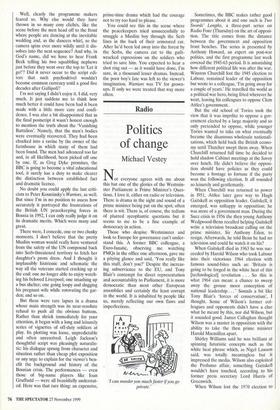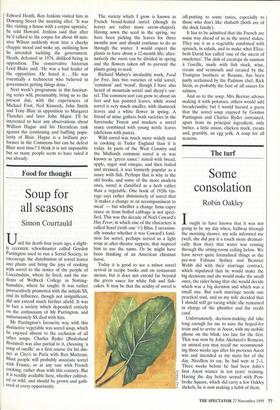Radio
Politics of change
Michael Vestey
Not everyone agrees with me about this but one of the glories of the Westmin- ster Parliament is Prime Minister's Ques- tions. I love it, either on radio or television. There is drama in the sight and sound of a prime minister being put on the spot; often there is wit. There is, of course, the tedium of planted sycophantic questions but it seems to me to be a fine example of democracy in action.
Those who despise Westminster and look to Europe for governance can't under- stand this. A former BBC colleague, a Euro-fanatic, observing me watching PMQs in the office one afternoon, gave me a pitying glance and said, 'You really like this stuff, don't you?' Despite the increas- ing subservience to the EU, and Tony Blair's contempt for direct representation and accountability to Parliament, it is more democratic than most other European assemblies and certainly the least corrupt in the world. It is inhabited by people like us, merely reflecting our own flaws and imperfections.
'I can murder you much faster if you go private.'
Sometimes, the BBC makes rather good programmes about it and one such is Two Swords' Lengths, a three-part series on Radio Four (Thursday) on the art of opposi- tion. The title comes from the distance
between the government and opposition front benches. The series is presented by Anthony Howard, an expert on post-war politics, and the first programme last week covered the 1945-63 period. It is astonishing how different political life was after the war.
Winston Churchill lost the 1945 election to Labour, remained leader of the opposition but wrote to a colleague, 'I'm going away for a couple of years.' He travelled the world as a political war hero, being feted wherever he went, leaving his colleagues to oppose Clem Attlee's government.
But the old school of Tories took the view that it was impolite to oppose a gov- ernment elected by a large majority and so only pretended to oppose, while younger Tories wanted to take on what eventually became the disastrous wholesale nationali- sations, which held back the British econo- my until Thatcher swept them away. When Churchill returned full time he decided to hold shadow Cabinet meetings at the Savoy over lunch. He didn't believe the opposi- tion should have policies as they could become a hostage to fortune if the party won the following election. It all sounded so leisurely and gentlemanly.
When Churchill was returned to power in 1951, Attlee later gave way to Hugh Gaitskell as opposition leader. Gaitskell, it emerged, was unhappy in opposition; he was more of a government man. During the Suez crisis in 1956 the then young Anthony Wedgwood-Benn recalled helping Gaitskell write a television broadcast calling on the prime minister, Sir Anthony Eden, to resign. Afterwards, he told Benn he had no television and could he watch it on his?
When Gaitskell died in 1963 he was suc- ceeded by Harold Wilson who took Labour into their victorious 1964 election with famous sound-bites such as: 'Britain is going to be forged in the white heat of this [technological] revolution . . . So this is what 1964 can mean: a chance to sweep away the grouse moor conception of national leadership ... ' Sounds a bit like Tony Blair's 'forces of conservatism', . I thought. Some of Wilson's former col- leagues and opponents didn't have a clue what he meant by this, nor did Wilson, but it sounded good. James Callaghan thought Wilson was a master in opposition with the ability to take the then prime minister Harold Macmillan apart.
Shirley Williams said he was brilliant at spinning futuristic concepts such as the white heat phrase which, as Nigel Lawson said, was totally meaningless but it impressed the media. Wilson also exploited the Profumo affair, something Gaitskell wouldn't have touched, according to his former press secretary Lord Harris of Greenwich.
When Wilson lost the 1970 election to Edward Heath, Roy Jenkins visited him in Downing Street the morning after. 'It was like visiting a house with a corpse upstairs,' he told Howard. Jenkins said that after he'd talked to the corpse for about 40 min- utes Wilson suddenly went into a cheeky chappie mood and woke up, outlining how he intended tackling the government. Heath, defeated in 1974, disliked being in opposition. The conservative historian Lord Blake said, 'He was a bad leader of the opposition. He hated it ... He was essentially a technocrat who believed in government getting things done.'
Next week's programme in this fascinat- ing series will, presumably, bring us to the present day, with the experiences of Michael Foot, Neil Kinnock, John Smith and Tony Blair in opposition to Margaret Thatcher and later John Major. I'll be interested to hear any observations about William Hague and his Herculean task against the continuing and baffling popu- larity of Blair. Hague is a brilliant per- former in the Commons but can he defeat Blair next time? I think it is not impossible but so many people seem to have ruled it out already.



























































































 Previous page
Previous page